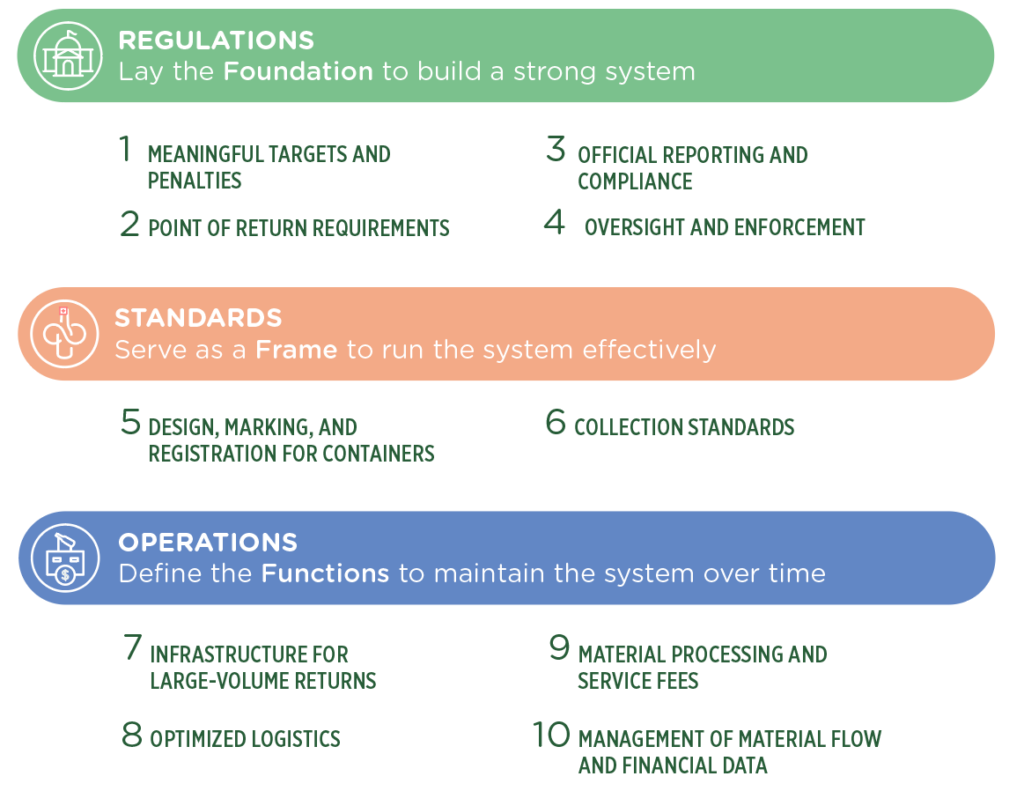The Last — But Far From Least — Principle
Welcome to the 10th issue of Bottle Bill Common Ground — a limited-series newsletter from Reloop North America highlighting evidence-based guidance for legislators, policy makers, industry, and advocates working on bottle bills. (If you haven’t read our first nine issues, you can do so here.) This issue focuses on the final Principle #10 of the 10 high-performance principles for an effective deposit return system (DRS). Next week, we begin our deep dive into 10 essential practices for better bottle bills, but first….

All nine previous DRS principles rely on the 10th: government oversight and enforcement.
At the end of the day, a modern DRS will only work if there are requirements that are actively overseen and enforced by government. Otherwise, producers and retailers would be left on their own to meet the high-performance standards that can lead to positive environmental and economic impacts.
The government’s role and the enforcement measures it can take should be clearly stated in all statutes and regulations related to DRS. Legislation should also name the specific penalties that will be levied for violations, and the government agency with the authority to enforce those penalties.
What is the right role for government in DRS? First and foremost, it is to craft clear and specific DRS/bottle bill legislation that is outcome oriented. It’s no secret that if you get it right in legislation, then less oversight is required. That legislation should, obviously, follow the 10 high-performance principles we have laid out in Bottle Bill Common Ground. There are also 10 essential practices that Reloop believes are essential to build into any bottle bill, grouped into three areas:

As important as government setting regulations with meaningful targets is the adequate enforcement of those regulations. When targets are not reached, government can get the program back on track through strong oversight and enforcement paired with penalties. Monetary fines and additional reporting requirements are two common penalties. Legislation could include, for example, a trigger to automatically increase the deposit value, either at a set period, to keep up with inflation, or whenever performance targets are not met.
Penalties must be higher than the cost of non-compliance. If the producer or distributor perceives the penalty as simply “the cost of doing business,” then the penalty is not strong enough to incentivize compliance and investment in system improvements.
Government, however, can only be effective in its oversight and enforcement role if it has adequate resources to play that role well. State agencies can often be overwhelmed trying to manage complex waste management systems with too little staffing or funding.
Reloop North America did research on the impacts of DRS modernization in five Northeast states and found that one of the positive economic impacts would be funds from unclaimed deposits that could help equip state agencies in those states with appropriate resources for proper oversight:

Thanks for reading! We encourage you to share this newsletter widely with those who want or need to know about these principles and practices. Working together from a common ground of knowledge, we can move good bottle bills forward. Sign up here to get these blog posts as emails.
